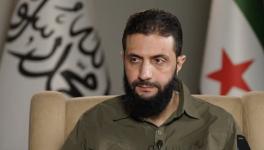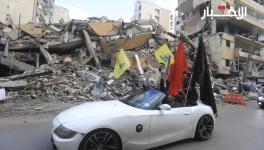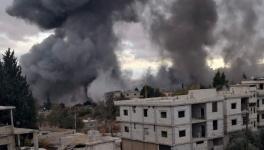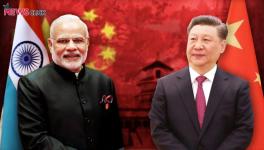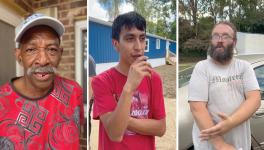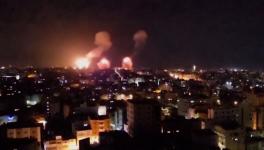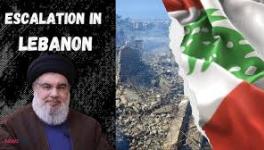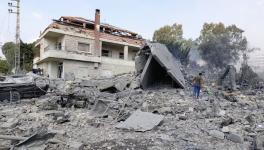Orlando Shooter Proclaimed Allegiance to Rival Terrorist Organizations
PRECIS
Orlando gunman Omar Mateen was "deeply incoherent in his understanding of Islamic movements," casting doubt over whether "radical jihadist terrorism" played any role in the murder of 49 people in the Pulse nightclub mass shooting, said Middle East scholar Vijay Prashad. "At some times, he apparently said he was a member of Hezbollah, which is the Lebanon- based militia group, largely a Shia group. At the other moment, he says that he is sympathetic to somebody with Al-Qaeda, the next minute with the Islamic State. Each of these groups is antithetical to the other," said Prashad. "This was largely an attempt by this man to make his own very ugly act something greater than what it was, which was, you know, I think, principally an act of extreme, radical homophobia." Prashad said the attempts to tie terrorist organizations to the mass murder "is a boon for groups like Al-Qaeda or ISIS." "They don't tell us what exactly happened here, which is the story of another mass shooting in America, another young man deeply deranged and delusional, alienated for whatever reason, who was able so easily to get an assault rifle and kill innocent people." "That's the real story, and unfortunately, the other story" of radical Islamism "strays us into territory of fear, suspicion, and hatred," said Prashad.
TRANSCRIPT
DHARNA NOOR, TRNN: Welcome to the Real News Network. Im Dharna Noor joining you from Baltimore.
On Sunday, a mass shooting at a queer nightclub in Orlando, Florida left 49 dead, 50 including the shooter, Omar Mateen. The FBI has disclosed that the shooter had proclaimed allegiance to both ISIS and Al-Qaeda, and is now investigating the mass shooting as a terrorist attack.
Now joining us to speak about this tragedy and its implications is Vijay Prashad. Vijay is the George and Martha Kellner Chair in South Asian History and Professor of International Studies at Trinity College. Hes the author of 20 books, the chief editor of Leftword Books, and a columnist for Frontline and Alternet. Thanks so much for joining us again, Vijay.
VIJAY PRASHAD: Pleasure.
NOOR: So, Vijay, earlier today FBI Director James Comey [purported] that this shooter said that he had allegiance to ISIS and Al-Qaeda, including a series of phone calls to 911 just before the attack.
JAMES COMEY: During the call, he said he was doing this for the leader of ISIL, who he named and pledged loyalty to. But he also appeared to claim solidarity with the perpetrators of the Boston Marathon bombing, and solidarity with a Florida man who died as a suicide bomber in Syria for Al-Nusra Front.
NOOR: So in light of this, could you speak a little bit about the dynamics between Al-Qaeda and ISIS, Al-Qaeda of which is the larger group of which Al-Nusra is an offshoot?
PRASHAD: Well, the first thing is, of course this is a great tragedy. And as they say, its one of the largest mass shootings in the United States, conducted, in this case, I think nobody denies, by a solitary gunman. He apparently acted alone, went in there with a very large assault rifle, and killed people at close range.
Now, it is also the case, as the FBI has said, that he made these phone calls over the course of three hours, claiming allegiance to ISIS, talking about the Boston Marathon bombers, and of course talking about his friend or acquaintance. The FBIs been going back and forth on this, who went and committed suicide in Syria with Jabhat al-Nusra.
Whats interesting about this particular killer is that not only, of course, was he deeply disturbed in many ways, including, of course, you know, somebody with a very radically, you know, hateful view of homosexuals, of gays and lesbians. In fact, a man with great homophobia. Not only do we know all this, but his views regarding, lets say, what the Clinton and Trump campaigns call radical Islamic terrorism seems rather incoherent. At some times he apparently said he was a member of Hezbollah, which is the Lebanon-based militia group, largely a Shia group. At the other moment he says that he is sympathetic to somebody with Al-Qaeda, the next minute with the Islamic State.
Now, each of these groups is antithetical to the other. There perhaps is no greater enemy at this time of Al-Qaeda than Hezbollah, because they are fighting directly in Western Syria. So Jabhat al-Nusra, which is the Al-Qaeda front of Hezbollah, have been at it against each other. So this young man seemed deeply, deeply incoherent in his understanding of Islamic movements. I think this was largely--and I agree here with his father. This was largely an attempt by this man to make his own very ugly act something greater than what it was, which was, you know, I think, principally an act of extreme, radical homophobia.
NOOR: And despite, of course, the sort of confused, incoherent allegiance, lets take a look at what Hillary Clinton said on NBC this morning.
HILLARY CLINTON: I have clearly said many, many times we face terrorist enemies who use Islam to justify slaughtering innocent people. We have to stop them, and we will. We have to defeat radical jihadist terrorism, or radical Islamism, whatever you call it, its the same. But we cannot demonize, demagogue, and declare war on an entire religion.
NOOR: So what do you think is the effect of using terms like radical jihadist terrorism?
PRASHAD: I think, unfortunately, this this sows fear in the population. You know, it creates distance between Muslims and others, or those who even appear like Muslims and others. It creates suspicion. You know, today, Mr. Trump in his speech said that Muslims are not turning in the terrorists, which is a very inflammatory comment.
So on the one side, you have extreme fear being produced in certain communities against other communities. And I think internationally this is a boon for groups like Al-Qaeda or ISIS and others. Instead of saying this has actually got nothing to do with those movements, that this is a young man, deeply deranged, who wanted to make his act grander than it actually was. Instead of actually coming out and saying that, which is what the facts demonstrate, by calling this extreme radical jihadism, et cetera, it feeds into the kind of, you know, delusions on an international scale that are held together by groups like ISIS and Al-Qaeda.
So on the one side we are sowing suspicion and fear, and on the other side you are giving, in a sense, confidence, and boosting the delusions of groups abroad. And I think thats a very dangerous outcome of this kind of rhetoric. Mr. Trump has, in a sense, boxed Hillary Clinton in. Hes made her use these terms. These terms are not very useful, theyre not helpful at all. In fact, they dont tell us what exactly happened here, which is the story of another mass shooting in America, another young man deeply deranged and delusional, alienated for whatever reason, who was able so easily to get an assault rifle and kill innocent people. Thats the real story, and unfortunately, the other story [strays] us into territory of fear, suspicion, and hatred.
NOOR: So what, then, are we to make of the fact that ISIS has actually claimed responsibility for this terrible, tragic attack?
PRASHAD: Well, its not only a question of ISIS. Al-Qaeda would have done this as well, if he had mentioned Al-Qaeda in his statement. You see, these kind of international groups that have great delusions of grandeur, you know, ISIS is not merely a terrorist group, but Abu-Bakr al-Baghdadi, its leader, claimed to be the caliph. It was not enough for him to claim territory. He wanted to claim the entire religion.
These groups have a great sense of themselves, and these so-called lone wolf attacks, or these attacks by people inside the United States and elsewhere who later just say that, you know, were doing this for ISIS, it just builds up or boosts the self-image of ISIS. You know, even the FBI has already said that there was no operational linkage between what this man did in Florida and the ISIS groups, whether in Syria, Iraq, or in Libya. There was no operational connection. This is merely an opportunistic connection, not operational.
And I think thats an important thing, that these groups like to take, to claim responsibility for things they have nothing to do with. And you know, it both boosts the killer and it helps out these groups abroad. But I think the FBI has also very clearly said that as of now, there is no linkage in operational terms. There was no planning, no provisional material. This was merely an opportunistic connection.
NOOR: Thank you so much for your analysis, Vijay.
PRASHAD: Thanks a lot.
NOOR: And thank you for joining us on the Real News Network.
End
DISCLAIMER: Please note that transcripts for The Real News Network are typed from a recording of the program. TRNN cannot guarantee their complete accuracy.
Get the latest reports & analysis with people's perspective on Protests, movements & deep analytical videos, discussions of the current affairs in your Telegram app. Subscribe to NewsClick's Telegram channel & get Real-Time updates on stories, as they get published on our website.









